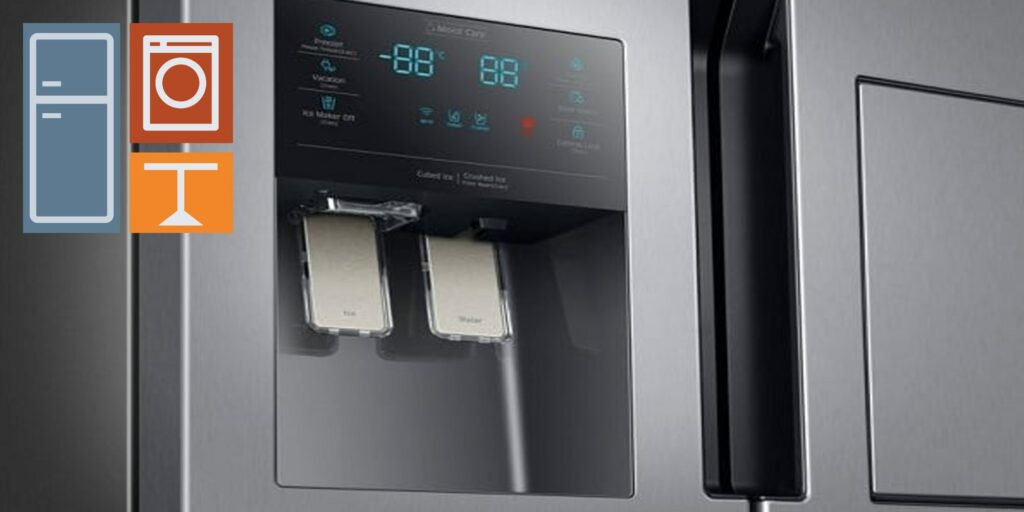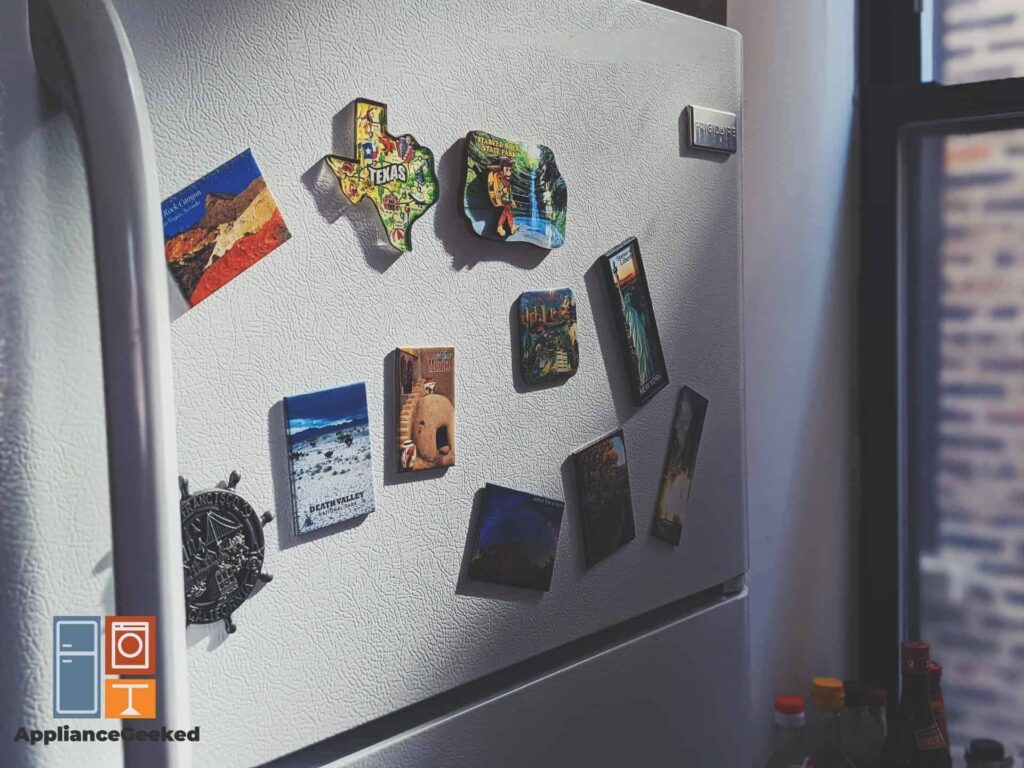Like most appliances, a Samsung refrigerator still has its faults. One of the most common ones is the water and ice dispenser that seemingly always malfunctions, sometimes even dispensing water and ice that have a foul taste and a horrid smell.
Luckily for you, we have all the ways you can troubleshoot this problem! After an hour or two, you’ll get fresh water ready for consumption.
Why does my Samsung fridge water taste bad?
The reason your Samsung fridge’s water tastes bad could stem from a multitude of different causes.
These include tap water issues, stored old food, old ice cubes, dirty water filters and ice makers, and the unit being brand new.
| Causes | Solutions |
|---|---|
| Tap Water Issues | Buy a home water filtration system to improve your water quality. |
| Brand New Refrigerator | Continuously dispense and dispose of water from your fridge for the first week or so. |
| Stored Old Food | Remove any stored food that has gone bad and disinfect the interior of your refrigerator. |
| Old Ice Cubes | Dispense your water and get rid of all ice that has sat in your fridge for weeks. |
| Dirty Water Filter | Change your water filter every six months or when the water starts tasting funny. |
| Ice Maker Requires Cleaning | Clean your ice maker every now and then to prevent foul odor from infecting your water and ice. |
Tap Water Issues
If your tap water has certain contaminants, it will obviously cause a bad odor or taste. Similarly, excessive minerals will have the same effects, and a standard water filter won’t be able to filter and remove these minerals.
Solution: Buy a home water filtration system and have it installed to add a second layer of filtration. This should remove all the contaminants that come from the water supply, resulting in fresh and clean drinking water.
Similarly, a water softener kit can also do the trick! If you can’t afford both, try calling your water supplier to evaluate your water source.
Some water filtration systems may be expensive, but they’re definitely worth the investment. If you’re unsure which one to get, you can tell the salesman what your issue is and your refrigerator model to get the perfect one.
Brand New Refrigerator
It may seem off to think about, but a brand new refrigerator can affect your water because of the dust and dirt that has settled in the water lines during manufacturing.
It goes without saying, but these will give dispensed water and ice a bad initial taste.
Solution: There are two ways to resolve this issue, the first one is by continuously dispensing water and throwing it away.
The second one is to simply wait it out for one week and throw away the first cup of water dispensed. Afterward, the water should taste fresh.
Stored Old Food
Ice and water will easily absorb food odor and drastically affect their taste. If your water is starting to taste bad, it’s best to check for spills or even expired food inside.
Solution: Check for spills or open food containers inside the fridge and immediately wipe them off or throw the food away.
Once you do, remove the remaining contents of your fridge and disinfect it to get rid of the foul or lingering odor.
We recommend mixing a cup of vinegar and a tablespoon of baking soda and using the solution to wipe the interior. Afterward, cut some lemons or oranges and leave them inside the fridge.
If possible, you should do this monthly to ensure your water and ice aren’t contaminated. You can also avoid throwing out unnecessary food by only purchasing food you can consume within a week.
Old Ice Cubes
If you haven’t used your ice machine for a while, it may have caused your ice to have gone stale. Believe it or not, ice can develop molds that will affect how it (and your water) tastes.
Solution: Always flush the dispenser’s water lines and get rid of the old ice in your ice bin. Afterward, wash the bin using soap and warm water, similar to how you clean your dishes!
It’s also ideal to clean your water bin weekly! If you can afford to, try and throw out the ice that’s been sitting in your fridge for over a week, as it can contaminate the food and water inside the fridge as well.
If you think the ice maker won’t be used for a week or two, seal the ice in zip-lock bags and keep the ice maker turned off until you’re ready to use it again. This will prevent ice from going stale and keep the machine safe and ready for use.
| Quick Note: DO NOT use bleach or anything that might affect the ice. You can use one or two drops of dishwashing soap, but make sure you thoroughly rinse the bin and try to use warm water to prevent foul odor from lingering. |
Dirty Water Filter
If your water filter is dirty, it will be clogged with the contaminants it screens out. This, in turn, will affect how it filters out the particles that contaminate your water.
Solution: Immediately replace your water filter if it starts to clog and affect the quality of your water. If you’re unsure how, here is the proper step-by-step process of how to change the filter:
- Step 1: Turn off your water supply valve.
- Step 2: Remove the old filter by turning it counterclockwise.
- Step 3: Insert the new filter into the compartment and carefully turn it clockwise until the lock symbol aligns with the indicator line.
- Step 4: Turn on your water supply valve.
- Step 5: Test it out by dispensing water and making sure the flow isn’t disrupted in any way.
If you have the time, you should always check your water filter! Even if it’s not yet fully dirty, it’s recommended to change it every two months to ensure you’re consuming safe and clean water.
| Quick Note: It’s better to ask which filter to buy, especially if you’re unsure which one fits your fridge the best. Similarly, you can always bring your old filter and ask for the exact same one! |
Ice Maker Requires Cleaning
Similar to stale and old ice cubes, a dirty ice maker may cause odor and mold that affect the quality of your ice. Hence, it’s recommended to clean it every now and then.
Solution: If you start noticing a foul smell or an unwelcome odor lingering from your ice maker, then it’s a sign to start cleaning it!
Here is the proper step-by-step process on how to clean your ice maker:
- Step 1: Turn your ice maker off.
- Step 2: Remove the ice bin and dispose of any old ice.
- Step 3: Wipe down the bin with a clean cloth dipped in warm and soapy water.
- Step 4: Using a separate cloth, dip it in warm and soapy water and wipe down the ice dispenser and the other exterior parts of the piece.
- Step 5: Let your ice maker and ice bin dry completely.
- Step 6: Reinstall the ice bin and the ice maker.
- Step 7: Test it out and make sure the ice dispenses smoothly.
You should always check and clean your ice maker to avoid these issues. We recommend cleaning it monthly or at least throwing out unused ice every week.
| Quick Note: Avoid using bleach to clean your ice bin and ice maker. One or two drops of dishwashing soap should do the trick! Additionally, make sure you’re using warm water to wipe down the ice bin and maker. This prevents soap from lingering and infecting your ice. |
Note that these are just some of the most common reasons why your water and ice taste bad. There may be some other factors that only affect certain models, but those are few and far between.
Additionally, these are ways you can fix these issues by yourself! If you have a hard time troubleshooting the issues using our steps, we recommend asking for professional help instead.
You should also identify what the issue is first before acting on it. Following the wrong solutions may result in irreversible damage to your Samsung refrigerator.
There you have it! We hope you got a sense of idea as to what’s causing the foul taste in your Samsung refrigerator’s water and ice.
Hopefully, our tips on how to combat these issues will serve you well moving forward if a similar incident occurs. Just try to remember that the cause of issues such as these will always stem from improper hygiene.
So be sure you keep your refrigerator clean and tidy and try to avoid using cleaning agents that produce a foul taste or may leave a lingering scent. If unsure, just know that dishwashing soap is always good enough to wash your ice bin or water dispenser!
Lastly, we hope you got a sense of what to do to avoid issues such as these, as the way to prevent them is similar to how you fix them! Keep everything clean and be sure to check for any external faults that might affect your fridge.




